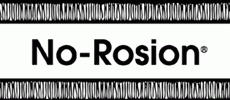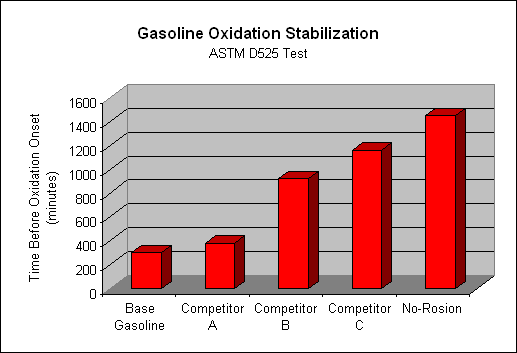

![]()
|
|
|
|
|
How do carbon deposits cause detonation? Carbon deposits in the combustion chamber form hot-spots that remain incandescent between combustion cycles. This causes ignition of the fuel charge before the regular ignition spark, resulting in detonation. If the premature combustion is completed before occurrence of the regular spark, there may be no identifying noise. So you will not even know that it is happening! But if the regular ignition spark follows shortly after the preignition occurs, you will hear a tell-tale pinging noise when the two flame fronts collide. This is illustrated in the sequential series of images below.
No-Rosion Fuel System Combustion Optimizer is a highly concentrated, fully synthetic fuel additive that contains our proprietary polyether amine (PEA) detergent technology. It provides a very unique combination of benefits that would normally require the use of a few different types of fuel additives in order to be achieved. Specifically:
The detergents in No-Rosion Fuel System Combustion Optimizer are also very effective in cleaning carburetor jets and fuel injectors, which can lose optimal fuel nebulization performance due to gumming and coking caused by oxidized fuel. Better nebulized fuel delivery further optimizes engine performance. Just how effective is No-Rosion Fuel System Combustion Optimizer in its ability to prevent oxidation of ethanol in today's gasoline blends? We are able to quantify its oxidation stabilization performance using the ASTM D525 Standard Test Method for Oxidation Stability of Gasoline. In this test, oxidation of gasoline is artificially accelerated by laboratory means. The amount of time before initial onset of gasoline oxidation is quantified. In our tests, our product outperformed several of the leading competitive gasoline stabilization products available on the market. The results are graphically illustrated below. |
|||
 |
|||
|
Extensive fleet testing has yielded the following additional quantified benefits:
What differentiates Combustion Optimizer from other products? No-Rosion Fuel System Combustion Optimizer is EPA, CARB, and TOP TIERTM compliant. It does not promote oil sludging, and is 100% synthetic. It has multiple OEM engine manufacturer approvals, and is fully soluble in all commercially available blends and types of gasoline. It outperforms all other additives in ASTM fuel stabilization tests, and does not contain PIB (polyisobutenamine), and ingredient found in some other products that is known to promote oil sludging. It can be used in engines having any fuel delivery type, including carburetion, port fuel injection, and direct fuel injection. It cleans far more effectively than traditional mineral-based additives, and is completely safe for oxygen sensors and catalytic converters. It helps prevent premature spark plug fouling, and protects gas gauge sensors from malfunctioning. How does the product pay for itself? No-Rosion Fuel System Combustion Optimizer pays for itself in only one fill-up! The octane requirement reduction associated with having more optimal combustion of fuel in your engine allows you to switch from premium unleaded to a mid-grade fuel without detonation or performance loss. At today's fuel prices, this saves at least 40 cents per gallon (or about $8.00) for a 20 gallon tank. A 3.2% increase in fuel economy saves another $2.00, for a total savings of about $10 -- enough to pay for a bottle of product. DIRECTIONS FOR USE: One 8 ounce bottle of concentrated product treats 20 gallons of fuel. Add every 3,000 miles in order to keep a system clean. For clean-up of heavily fouled or previously neglected systems, add to three tanks in a row. For stored or infrequently driven vehicles, add before and after idle periods. Use in conjunction with No-Rosion Fuel System Octane Booster to achieve synergistic performance enhancements. |
|
 |
|
DID YOU KNOW... No-Rosion was in the cooling systems and fuel systems of twelve award-winning classics at the 2024 Pebble Beach Concours d'Elegance! Copyright 2025 Applied Chemical Specialties, Inc. |